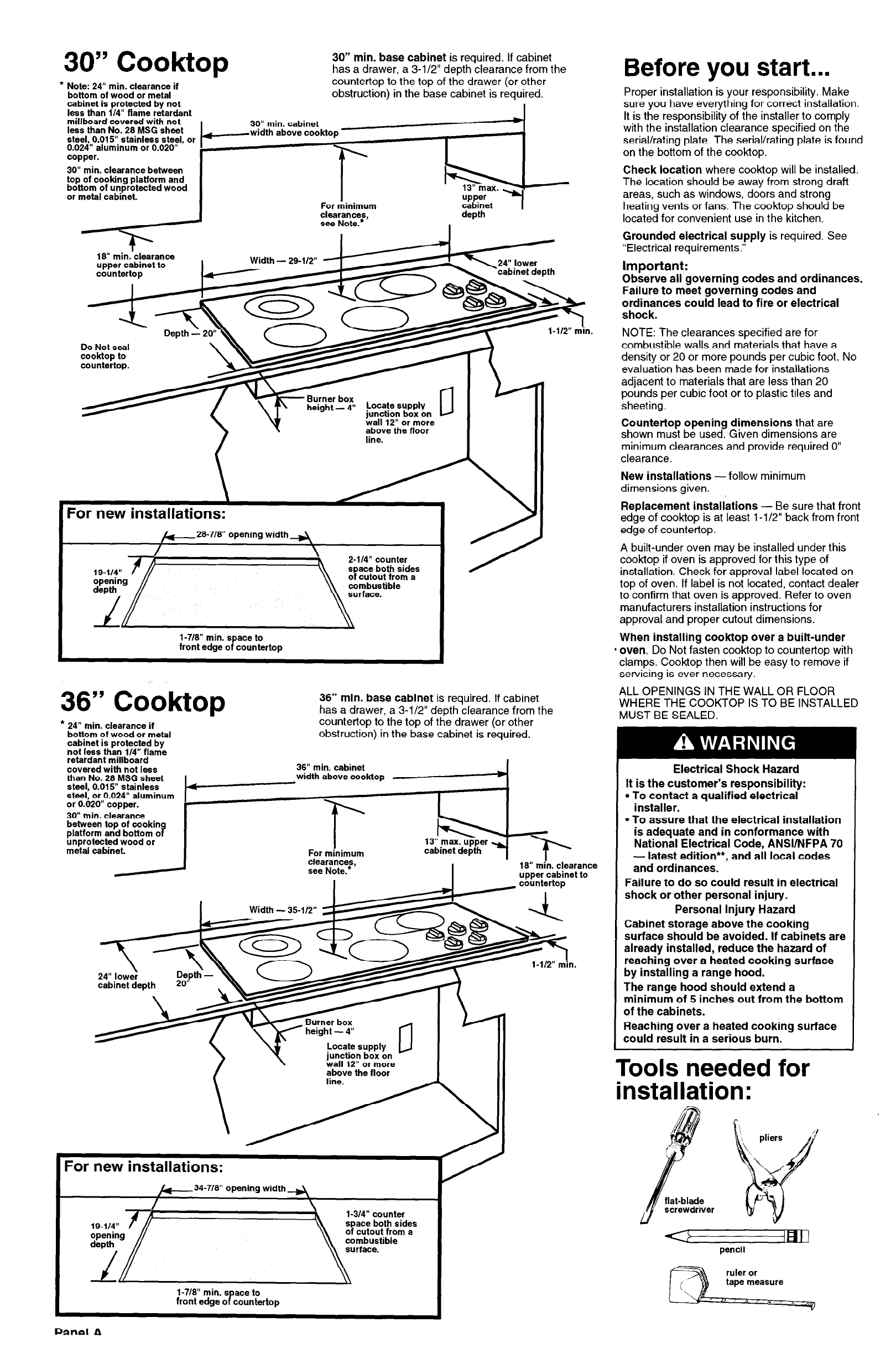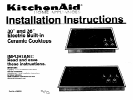
30”
Cooktop
l
Note: 24” min. clearance if
bottom of wood or metal
cabinet is protected by not
less than i/4” flame retardant
30” min. base cabinet is required. If cabinet
has a drawer, a 3-l/2” depth clearance from the
countertop to the top of the drawer (or other
obstruction) in the base cabinet is required.
I
millboard covered with not
less than No. 28 MSG sheet
I-
30” min. cabinet
>
steel, 0.015” stainless steel, or
width above cooktop
0.024” aluminum or 0.020”
copper.
I
30” min. clearance between
top of cooking platform and
bottom of unprotected wood
or metal cabinet.
For minimum
clearances,
see Note.*
depth
I
Do Not seal
cooktop to
countertop.
iunction
box on
above the floor
line.
For new installations:
+28-718” opening width 4
/
\
l-718” min. space to
front edge of countertop
l-112” m’in.
36” Cooktop
36” min. base cabinet is required. If cabinet
has a drawer. a 3-l/2” deoth clearance from the
* 24” min. clearance if
bottom of wood or metal
cabinet is protected by
not less than l/4” flame
retardant millboard
covered with not less
than No. 28 MSG sheet
steel, 0.015” stainless
steel, or 0.024” aluminum
or 0.020” copper.
30” min. clearance
between top of cookin
platform and bottom
o
3
unprotected wood or
metal cabinet.
I
countertop to’the top of the drawer (or other
obstruction) in the base cabinet is required.
36” min. cabinet
width above cooktop
f
For minimum
clearance:,
see Note.
18” min. clearance
upper cabinet to
\
junction box on -
wall 12” or more
I II
above the floor
I I
For new installations:
634-718” opening width &,
l-718” min. s ace to
front edge o P countertop
Before you start...
Proper installation is your responsibility. Make
sure you have everything for correct installation.
It is the responsibility of the installer to comply
with the installation clearance specified on the
serial/rating plate. The serial/rating plate is found
on the bottom of the cook-top.
Check location where cooktop will be installed.
The location should be away from strong draft
areas, such as windows, doors and strong
heating vents or fans. The cooktop should be
located for convenient use in the kitchen.
Grounded electrical supply is required. See
“Electrical requirements.”
Important:
Observe all governing codes and ordinances.
Failure to meet governing codes and
ordinances could lead to fire or electrical
shock.
NOTE: The clearances specified are for
combustible walls and materials that have a
density or 20 or more pounds per cubic foot. No
evaluation has been made for installations
adjacent to materials that are less than 20
pounds per cubic foot or to plastic tiles and
sheeting.
Countertop opening dimensions that are
shown must be used. Given dimensions are
minimum clearances and provide required 0”
clearance.
New installations -follow minimum
dimensions given.
Replacement installations - Be sure that front
edge of cooktop is at least 1 -l/2” back from front
edge of countertop.
A built-under oven may be installed under this
cooktop if oven is approved for this type of
installation. Check for approval label located on
top of oven. If label is not located, contact dealer
to confirm that oven is approved. Refer to oven
manufacturers installation instructions for
approval and proper cutout dimensions.
When installing cooktop over a built-under
m oven, Do Not fasten cooktop to countertop with
clamps. Cooktop then will be easy to remove if
servicing is ever necessary.
ALL OPENINGS IN THE WALL OR FLOOR
WHERE THE COOKTOP IS TO BE INSTALLED
MUST BE SEALED.
Electrical Shock Hazard
It is the customer’s responsibility:
l To contact a qualified electrical
installer.
l To assure that the electrical installation
is adequate and in conformance with
National Electrical Code, ANSUNFPA 70
- latest edition**, and all local codes
and ordinances.
Failure to do so could result in electrical
shock or other personal injury.
Personal Injury Hazard
Cabinet storage above the cooking
surface should be avoided. If cabinets are
already installed, reduce the hazard of
reaching over a heated cooking surface
by installing a range hood.
The range hood should extend a
minimum of 5 inches out from the bottom
of the cabinets.
Reaching over a heated cooking surface
could result in a serious burn.
Tools needed for
installation:







